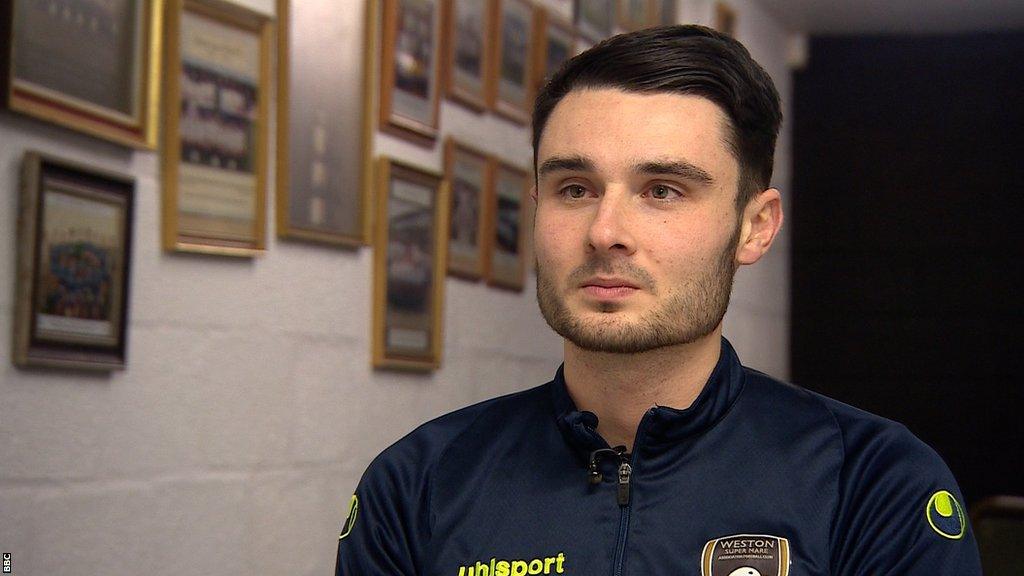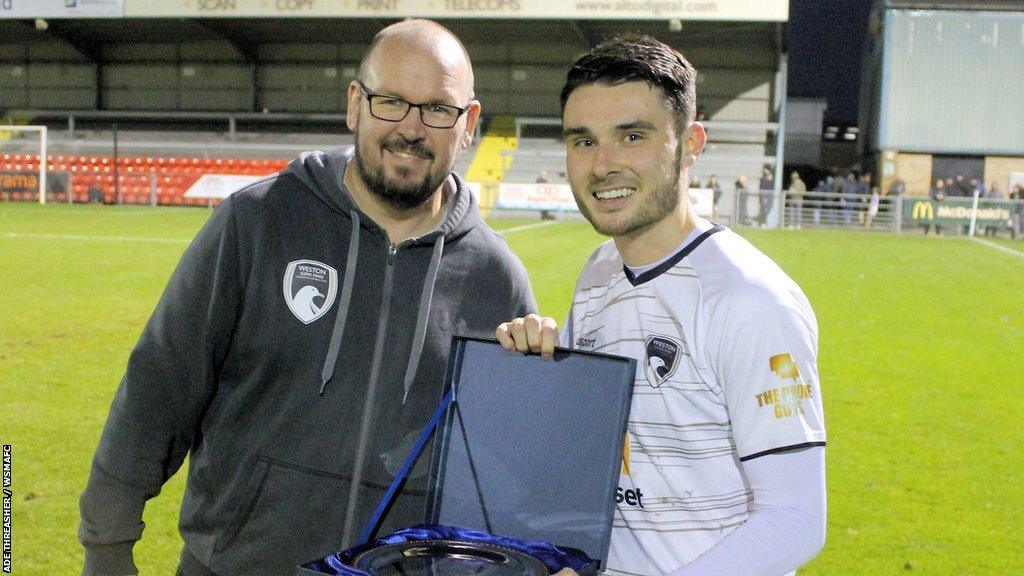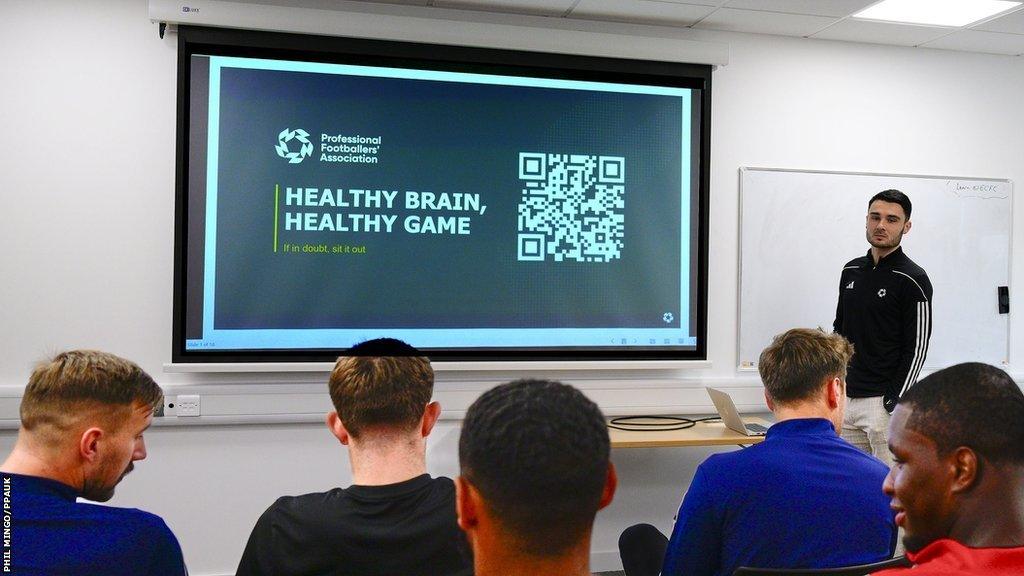Alex Fletcher: Ex-Bath City striker criticises lack of action after serious head injury
- Published

Alex Fletcher wants the regulations around football grounds to be reviewed following his accident last year
Footballer Alex Fletcher says player safety has been "swept under the carpet" a year after he suffered a serious head injury during a game.
Striker Fletcher, 24, crashed into concrete advertising hoardings during a National League South game in November 2022 while playing for Bath City.
He needed emergency surgery, was in a coma and did not play for 10 months.
"If I had lost my life I feel like more would have been done," Fletcher told BBC Points West.
"Now that I have recovered and got back on the pitch it has been a bit swept under the carpet."
Fletcher returned to football in August with Bath before signing for rivals Weston-super-Mare AFC in October.
He scored on his first start for the club in an FA Trophy second-round win against Cray Wanderers on 18 November.
Fletcher has also taken a new role with the Professional Footballers' Association (PFA) in their Brain Health department and has been travelling to clubs to educate players on the importance of looking after their brains.
"I won't stop," Fletcher said. "I'll make sure that with my new role with the PFA I'll keep driving for change to improve player safety because for me it was almost the end.
"Luckily it wasn't, but there's not a lot that's changed in grounds up and down the country."
Alex Fletcher reflects on life-threatening skull injury which left him in five-day coma
The FA ground grading rules that apply to all football clubs include the run-off distances between the pitch and any perimeter - Bath's Twerton Park met and exceeded the distance required around the edge of its pitch and had all the relevant health and safety certificates.
However, Fletcher points to other factors such as materials used around those perimeters needing to be considered within regulations, while also calling for players to be involved in risk-assessment discussions.
"We need to look at the surfaces those pitch perimeters are built with, especially the lower down the level you go," Fletcher said.
"The older grounds in the lower ends in the Football League, you've got a lot of these quite simply unfit-for-purpose materials, like brick walls around the pitch.
"Although they house the advertising hoardings they are not fit for purpose. That needs to be reconsidered."
A spokesperson for the FA said: "The safety of participants and spectators across the game is of utmost importance and, under health and safety legislation, it is the responsibility of the clubs and venue owners to ensure participants are safe at their grounds.
"In addition, we work closely with the other footballing authorities to set the ground grading criteria for clubs, and all grounds across the National League system are assessed in line with the required criteria."
This summer, Sports Minister Stuart Andrew, along with the PFA, sent a letter to all of the football authorities asking them to review whether lessons can be learned from incidents such as Fletcher's.
It is an area they are continuing to campaign on.
"If there was to be another incident involving a player being seriously injured, it clearly won't be acceptable to look back at what happened to Alex Fletcher and say that lessons weren't learned," a spokesperson for the PFA said.
'Strength and drive to come back'
Fletcher said he remembers the night of the accident "vividly".
While he is almost entirely "back to prime health" 13 months on, he had to relearn to walk, is permanently deaf in his left ear and now wears a hearing aid while playing.
He said the six months before his surgeon gave him the all-clear to return to football were challenging, not knowing if he would ever come back.

Alex Fletcher (right) was awarded man of the match after scoring for Weston on his first start
"It was a real strange place, it was quite an isolating, lonely place," he said.
"I was doing my general rehab to get myself back fit without that target at the end of it to know if I was going to be able to play or not.
"It was hard mentally to get through that but I kept plugging away, kept my mind at it and when I got that news it just gave me that extra push to get back to it."
In August, he received a standing ovation when he came on from the bench for Bath for his first appearance since the injury.
"That was a really special moment because everyone at the club was there with me through thick and thin, and supported my family really well at the hardest times," Fletcher added.
"It really did blow me away, the amount of messages but the words in each one of them were so sincere.
"Every single one of those messages, I believe, gave me the strength and the drive to go and break those barriers that I was talking about that were so hard to overcome.
"And that is a big reason why I'm back on the pitch and a similar person to what I was before the accident because of that outpouring of love."
'A new lease of life'

Alex Fletcher (right) delivered his first talk at Exeter City in his new role for the PFA's Brain Health team
Having come out of the other side of a major brain trauma, Fletcher believes he is in a perfect position to talk to current players and advocate for player safety.
He points to research that has found football players are more than three times as likely to develop dementia than the general population and how heading the ball has been linked to brain injury.
"It's getting that data out to players and giving them the knowledge so they can empower themselves to make any changes to training habits and potentially playing habits as well," Fletcher said.
"The things that I have seen first hand that can be affected with a severe brain injury, short-term but also long-term, has given me this new lease of life to use that and put that information to good use."
That being said, performing on the pitch for Weston-super-Mare AFC is Fletcher's priority to start with.
"Legacy wise I've still got a hell of a lot to owe the game," Fletcher said.
"I'm only 24, my career luckily hasn't been cut short at this point and I still feel like I've got a lot to give on the pitch.
"Over the next hopefully 10-15 years while I'm still playing, but beyond that as well into my football retirement, I'm hoping to continue this positive change but also informing players and empowering them to make their own decisions on brain health."